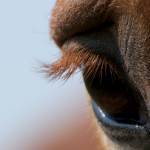Checking Your Horse’s Vision

Stumbling, reluctance to move forward, shying, spooking when you enter your horse’s stall…each of these behaviors can be related to several possible problems, but together they may indicate your horse has a problem seeing well. A veterinarian’s examination will give you answers to questions about your horse’s vision, but there are some easy tests you can use to get a general idea of whether your horse can see well.
- Cover one of your horse’s eyes with your hand and use your other hand, or a helper, to move a small object back and forth in the field of view of the horse’s other eye. Watch to see if the horse tracks movement with the uncovered eye, and then try the same thing with his other eye.
- Lead your horse over jump poles or logs. If he trips or stumbles over these obstacles, it’s possible that he’s not seeing them clearly.
- Watch your horse as you lead him up and down over a curb, across an object like a thin whip or garden hose, and from a lighted/sunny area into a dark or deeply shaded place. Reluctance to go forward may indicate vision problems.
- Shine a bright light into your horse’s eyes. A normal response is to blink or avoid the bright light (dazzle response), and the pupils in both eyes should constrict (pupillary light reflex).
There are other explanations for all these reactions, so if you have doubts about your horse’s vision, especially if he already has any disease that affects his eyes, ask your veterinarian or a veterinary ophthalmologist for an examination.
Even if the horse gets a clean bill of visual health, use good management practices as you ride and work around him. Speak to him before entering the stall; keep a hand on him as you move while grooming; give him a chance to look at terrain or objects that may seem strange. Horses are naturally suspicious of things with which they are not familiar, so work with your horse and don’t punish him for taking a moment to make sure he (and you) will stay on safe footing as you ride.








